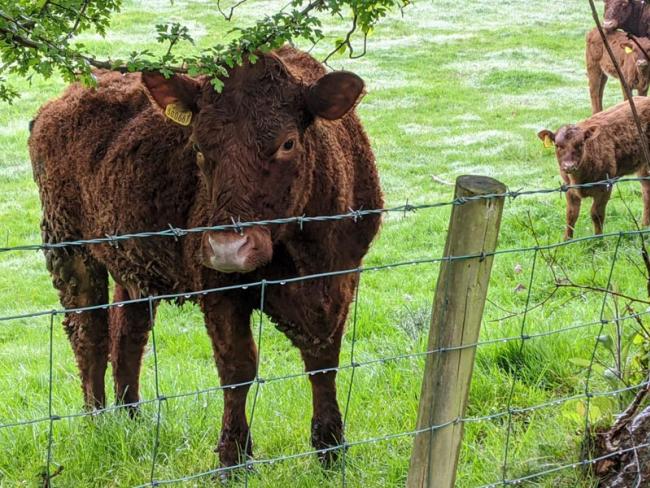
Limousin heifer, Wales. Almost 600 farms straddle the Welsh and Scottish borders with England, rendering separatism a hindrance to a national strategy. Photo Workers.
There’s a new strategy for food – but it’s not right for Britain…
The National Food Strategy’s first report, published on 29 July, falls far short of what the country needs. Led by a businessman and member of the Dimbleby family (Henry), the report was meant to cover the whole food system, “from field to fork”. Incredibly, it is the first report of this type produced in Britain in 75 years.
Despite its laudable purpose – “to set out a vision for the kind of food system we should be building for the future, and a plan for how to achieve that vision” – the report is piecemeal. Without the support of a wide-ranging and rigorous analysis of food production and distribution, it fails in its attempt to use Covid-19 to illuminate particular problems in our food supply.
The second report, not due for another six months, promises far more – to “examine the food system from root to branch, analysing in detail the economics and power dynamics that shape it, the benefits it brings and the harms it does.” Also, “There will be much, much more on health and on the interwoven issues of climate change, biodiversity, pollution, antimicrobial resistance, zoonotic diseases and sustainable use of resources.” We won’t hold our breaths.
After this, a government working party will take six more months to draw up a White Paper. And six months later, in 2022, Dimbleby will conduct a further review. Such slow policy making compared to that of our hospitals who transformed patient pathways, buildings, and procedures overnight even as they were being hit by the pandemic!
Disjointed
This disjointed, snail-like approach to a Food Strategy is further weakened by confusion about what constitutes the “nation”. Pandering to separatism, the report is solely focused on England, and ignores Wales and Scotland. Not national at all then, despite the authors’ admission that “the food systems of the UK are so tightly interwoven as to be indistinguishable in many ways. Almost 600 farms straddle the borders of Scotland and Wales to take one small example.”
Holyrood and Cardiff may pontificate on food policy but have no say on the crucial issue of trade, one of just two topics covered in the report (the other being the diet of disadvantaged children – largely pre-empted by the government’s Tackling Obesity strategy, launched a few days earlier).
Ducking the question of how the British people can exercise control over what food we import (and hardly discussing exports at all), the report prefers to delegate setting “core standards” to the Trade and Agriculture Commission, established in July with a fixed life of six months.
There should be what it calls independent impact assessments, to be carried out possibly by consultants (more fees for the Big Four consultancy firms, no doubt) before new trade deals are scrutinised by Parliament.
The report’s analysis of the effects of the Covid-19 pandemic – our food system’s “biggest stress test since the Second World War” – is useful for workers to consider.
During lockdown, the big supermarkets consolidated their grip on food supply as open-air markets closed. They increased their market share – 96 per cent of the market of calories consumed nationally. And remember that with the hospitality industry shut down, the 20-25 per cent of food consumed outside the home vanished during lockdown, as people prepared that food in their own homes, so that market was even bigger. And, of course, they kept their grip on prices, though the report obscures this point.
It does highlight the drastic effect of Covid-19: workers in the food and retail sectors suffered some of the highest death rates, a higher proportion of furloughed staff, and expected redundancies.
The list of those involved in or consulted during the preparation of the report excludes any trade unions. One would have expected shop and food workers’ unions Usdaw and Unite to have been involved, at least.
Even the TUC might, if pushed, have had something of value to add.
Instead, the Landworkers’ Alliance was consulted. Part funded (of course) by the EU, its website is a word-salad of social justice buzzwords.
The British working class has no need to beg for representation on Dimbleby’s Review, or any other body. It is clear from its first report that we should not pin our hopes for a robust approach to trade, rooted in our productive capabilities, on others. We should write the strategy ourselves.
• Related article: Poverty and riches – the sad tale of Britain’s food
